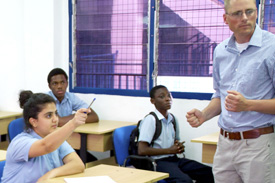 This year it was reported that teenagers in England sat 44,000 fewer GCSEs in arts subjects, with a 7.7% drop on 2015 figures. There was an overall fall of 0.4% in the number of GCSEs taken, significantly lower than the arts figures drop. In addition, there was a drop in the number of young people taking A levels in arts subjects, which appears to be linked to falling GCSE entries. Some believe this drop is due to the new EBacc already having an adverse impact on study decisions, with less students sitting exams such as drama, dance and music.
This year it was reported that teenagers in England sat 44,000 fewer GCSEs in arts subjects, with a 7.7% drop on 2015 figures. There was an overall fall of 0.4% in the number of GCSEs taken, significantly lower than the arts figures drop. In addition, there was a drop in the number of young people taking A levels in arts subjects, which appears to be linked to falling GCSE entries. Some believe this drop is due to the new EBacc already having an adverse impact on study decisions, with less students sitting exams such as drama, dance and music.
At present the Government plans to make at least 90% of pupils take the EBacc – a set of seven or eight GCSEs, which includes history or geography but not the arts – which presumably will discourage young people’s artistic ambitions and undermine the UK’s creative industries. This is already indicated by the falling exam numbers for 2016. This news contradicts assertions made by the Schools Minister that there is little evidence that the take up of arts GCSEs is declining, and that the EBacc will have no affect on numbers.
The EBacc was introduced in 2010 as a performance measure; since then there has been a 20.3% fall in the number of young people taking GCSEs in art and design subjects, design and technology, drama, media film and TV studies, music, and performing/expressive arts – equivalent to 133,500 fewer GCSEs. This year, design and technology suffered the greatest fall in students, with 18,600 fewer entries, representing a 9.7% drop. Drama entries fell by 3,200, a 4.6% drop, and there were 1,800 fewer entries for music GCSEs, a 4.1% decrease.
The fall in arts GCSEs coincides with a rise in the number of young people taking subjects included in the EBacc. Here 16,700 more pupils took a GCSE in geography last year, a 7.9% rise for example, and 15,200 more pupils took history, a 6.7% increase.
